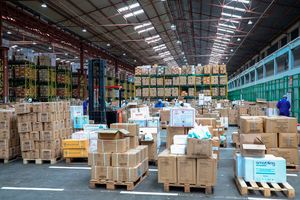Why Kemsa plans to stock private chemists

Kemsa Acting Chief Executive Officer Dr Andrew Mutava Mulwa before the Senate Committee on Health in June.
What you need to know:
- Kemsa, which currently concentrates on stocking public facilities, plans to stretch to the private sector in the supply of drugs.
- Dr Andrew Mulwa, the Kemsa’s acting CEO, says this is part of a wider strategy to lower the cost of medicines.
The chemist near you may soon sell medicines commercially sourced by the government if a plan by the Kenya Medical Supplies Agency (Kemsa) succeeds.
Kemsa, which currently concentrates on stocking public facilities, plans to stretch to the private sector in the supply of drugs.
Dr Andrew Mulwa, the Kemsa’s acting CEO, says this is part of a wider strategy to lower the cost of medicines.
Venturing into the private sector, Dr Mulwa says, will be done through a commercial venture currently under consideration.
“We are going to use a pooled mechanism working with local manufacturers so that we reserve commodities — we buy from local manufacturers, guarantee them a market and also for them to guarantee us quality and low prices on the medicine,” he says.
“We are thinking about exploring a commercial entity or a commercial venture for the organisation that will be able to reduce the cost of medicine in the chemist that is near you,” adds Dr Mulwa.
Dr Mulwa became Kemsa’s acting CEO in May following a stinging scandal about the procurement of mosquito nets that led to President William Ruto dismissing the then Public Health principal secretary and the entire Kemsa board plus the CEO.
Dr Mulwa’s remarks regarding Kemsa joining private sector distribution came when Healthy Nation asked him about Kemsa’s strategy towards aligning with the government’s Universal Health Coverage plan.
“The President has been gracious enough to allocate resources towards capitalisation of Kemsa to the tune of Sh2 billion. This will enable us to stock the essential vital commodities that are required by the public in our public health facilities. We will also go beyond the public health facilities and consider mechanisms of ensuring that we also bring down the cost of buying medicine even in the private sector,” notes Dr Mulwa.
Kemsa currently supplies medical products to more than 9,000 public health facilities in all the 47 counties, some in far-flung islands and insecurity-prone areas that private players would barely find attractive.
Asked about the all-too-common complaint of empty shelves in the pharmacies of public hospitals, Dr Mulwa says the fill rate (percentage of orders that are immediately serviced by the available supplies) is improving.
“Our order fill rate when we came in in May was about 49 or 47 per cent. We have ensured that first, for the funds that we get, we prioritise the purchase of essential medicines which are what we call the vital tracer commodities (VTS) and class-A commodities,” he says.
“So far, there are 52 commodities that we are tracking as the VTS. At the beginning, we only had a stock of about eight. Of course this has improved. Currently, we have stock of all, except 12. And in these 12, in the current tenure, we have already identified suppliers who will bring the 12. So, we will have 100 per cent of the tracer commodities that we are tracking. This will obviously improve the order fill rate, especially for the rural health facilities,” adds the Kemsa boss.
He, however, admits that the fill rate for bigger hospitals above Level three needs some work.
“In a month or two, I can confidently say that overall, we will be above 75 per cent for all products. Our target should be at 90 per cent by the end of the year.”
Meanwhile, Kemsa is rewriting its procurement plan, banking on Kenyan-based manufacturers for the supply of products.
“We have ensured that our tenders are preserved for local manufacturers. This, of course, comes with the advantage of quick turnaround times in terms of delivery of products because whenever we are buying products from abroad, it takes between three and five months for products to actually come to this country. When we are dealing with local manufacturers, of course the turnaround time will greatly improve,” said Dr Mulwa.





